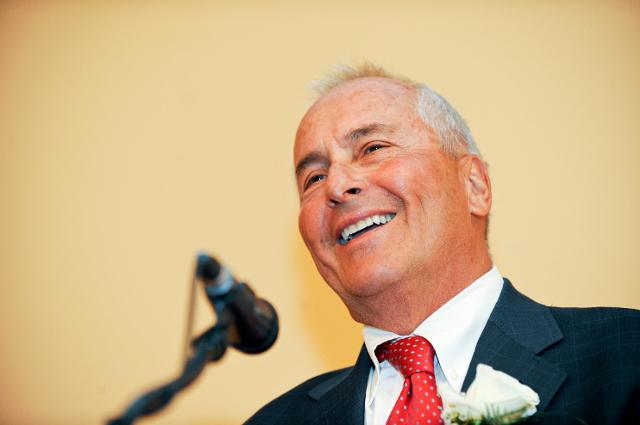-
About
-
Academics
- Physician Assistant
- Special Master’s (MBS)
-
Admissions & Financial Aid
- Tuition & Fees
-
Student Life
-
Research
- Research Labs & Centers
-
Local & Global Engagement
- Global Health Program
Marching into Medicine
Five Tufts University School of Medicine graduates reflect on their military service

By Molly McDonough
Whether by choice or conscription, hundreds of Tufts University School of Medicine graduates have served with the U.S. Armed Forces over the school’s 126-year history. In 1943, the middle of World War II, four out of five medical students wore either Army or Navy uniforms, their education supported by the government.
Graduates continue to serve today. In the last ten years alone, sixty graduates have matched to residencies in the military. Many students have taken advantage of the Health Professions Scholarship Program, begun in 1972, which offers scholarships in return for a service commitment to the Army, Air Force, or Navy following graduation.
We caught up with five alumni to learn more about what it’s like to sacrifice civilian status as a young doctor to embark on a life-altering adventure of medicine through service.
Nicholas Panarello, M19
Lieutenant, U.S. Navy; orthopaedic surgery resident, Walter Reed National Military Medical Center
From the start of college I knew I wanted to go to medical school. The Navy Health Professions Scholarship Program allowed me to avoid the stress of taking out loans while pursuing my goal of becoming a physician. Plus, there were a couple of influential people in my life who I respected and looked up to who told me that I would fit well into a military environment.
During medical school, the military commitment was fairly light, considering—I think they recognize that medical school is tough enough. I was still able to choose my preferred specialty and apply for it. The Navy has the final say, but the application process is similar to that of the civilian sector. If you’re a competitive applicant, you have a better chance of securing your preferred specialty and training location. I’m specializing in orthopedic surgery, and it’s a phenomenal opportunity. Military medicine is largely orthopedic medicine, with young, healthy people getting injured while working out or participating in training exercises.
For residency, I’ll be training at Walter Reed National Military Medical Center, where much of the wounded warrior care happens. I’ll take care of people who have suffered traumatic injuries and help them get back on their feet. It’s an experience I wouldn’t have anywhere else.
Neel Shah, A08, M12
Major, U.S. Army; officer in charge, anesthesiology, Landstuhl Regional Medical Center, Germany
When you sign up for the Health Professions Scholarship Program, you essentially make a 1:1 commitment; for a year of school, you owe the military a year of service after residency. I had almost no contact with the Army during med school, aside from officer basic training—which is nothing like the basic training you see in the movies; it’s geared towards physicians and dentists—and then during two audition rotations for residency the third and fourth years.
After completing your internship, you’re often asked to do a tour as a general medical officer—essentially, primary care for a battalion of soldiers—and during that time I was deployed to Liberia for the Ebola crisis. Despite learning about it in medical school, you never think you’ll be involved with something like Ebola in real life.
There were a host of other illnesses, both common and uncommon, but things I never would have thought I’d personally see or manage. But Tufts had pushed me to not put my blinders up, to think about the unexpected, to make a good differential diagnosis. I took that lesson to Liberia.
In Liberia, I was Officer in Charge of the Headquarters Aid Station. I think one thing that distinguishes military medicine from the civilian medical community is that in the military you get a chance to be a leader quickly and effect immediate change. It’s an incredible opportunity and an asset for whatever you end up doing later— it’s something I really like about the military that I wouldn’t have initially expected.
Read more Tufts Med alumni's reflections on their military service.